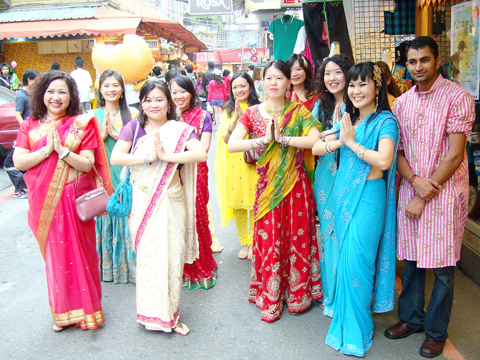Although the finer details of Indian culture can make many Taiwanese feel all at sea, there seems to be an undertow that is attracting people toward the South Asian country.
This is evident not only from the sold-out screenings of the award-winning hit movie Slumdog Millionaire, but also from the packed Bollywood dance classes, yoga classes and the growing market for Indian clothes and accessories.
Slumdog Millionaire, which swept this year’s Oscars with eight awards and warmed hearts with its rags-to-riches story, turned the eyes of the world toward social issues in India.

PHOTO: CNA
It has also fueled a craze in many countries for Indian music and dance, as well as other aspects of Indian culture.
The question of whether the movie presents an accurate portrait of India has been discussed at length in the international media and elsewhere.
But for people in Taiwan who already feel some degree of affinity for India, the movie serves as a point of reference and a touchstone of Indian culture.
In Taipei, an Indian accessories store called Rana Legend in the Ximending area is a popular gathering point for Indian culture enthusiasts.
On the day this reporter visited the store, a dozen women dressed in saris and wearing exotic bangles, earrings, necklaces and bindis were preparing to hit the streets. Their mission was to wear their Indian outfits to the movie theater where they were going to see the Bollywood movie Taare Zameen Par (Stars on Earth).
The group, which included a civil servant, a student, a school nurse and a housewife, said that what they loved was the profundity and richness of Indian culture.
Candy Sun, who teaches Bollywood dance to more than 500 students at community schools and sports centers, said that she could sense a growing interest in Indian culture as more and more women, and even some men, were taking her classes.
Sun said that destiny took her to India five years ago to learn Indian dance and she fell in love with the country for no discernible reason.
“I can feel it in my blood,” said Sun, who at first was a belly dance instructor. “I learned Hindi really fast and I can identify with everything in India.”
Sun said her strong feelings for India were later explained to her by a guru whom she met during a pilgrimage to an upstream area of the River Ganges. Sun said the guru told her that in one of her previous lives she was Indian.
And “you knew that yourself,” she said she was told.
Another of the women in the group, Lu Li-huei, said that she has visited the subcontinent five times and every time she goes to India, she finds the country even more fun and the culture even more diverse than she had imagined.
“To gain a good understanding of India, you have to make personal contact with it,” said Lu, a civil servant at the Ministry of Transportation and Communications’ Civil Aeronautics Administration, who practices yoga and has learned Indian dance.
She admitted, however, that she found it hard to identify with some aspects of the culture, such as the caste system.
“As an outsider visiting the country, I can only look at the culture from the perspective of an observer,” she said.
The movie Slumdog Millionaire epitomizes the poverty in the Indian slums, Lu said.
“However, it is a movie with a conveniently fluid notion of reality and it does not reproduce how shocked and upset I was when I personally saw children competing with dogs for food in a filthy and stinking dump,” she said.
For school nurse Helen Chen, her fascination with India started two years ago when she began learning belly dance and Indian dance.
She said she was particularly taken with the beauty of the sari.
“It’s amazing how a 5m length of exquisitely embroidered cloth can perfectly complement the curves of a woman’s body,” said Chen, dressed in a carefully draped beige sari with delicate pink beadwork. “Moreover, it is extraordinary that the same sari can look completely different on different women.”
The sari also holds an attraction for Galina Chang, a freshman majoring in Russian at National Chengchi University, although her interest is more that of a collector.
But it was from her hobby of collecting traditional garments from around the world that her passion for Indian culture grew.
Chang, who owns 20 saris, said that when she wears them she feels more free compared with the constrained feeling she experiences when wearing Japanese kimonos.
India might be 4,400km away from Taiwan, but it can be brought closer simply by sharing one’s passion for the culture with other aficionados, said Veney Ting, a self-taught henna artist.
The women said they would like to see this achieved through the current interest in Slumdog Millionaire, which they thought could raise awareness of India and attract people to learn more about that part of the world.

The German city of Hamburg on Oct. 14 named a bridge “Kaohsiung-Brucke” after the Taiwanese city of Kaohsiung. The footbridge, formerly known as F566, is to the east of the Speicherstadt, the world’s largest warehouse district, and connects the Dar-es-Salaam-Platz to the Brooktorpromenade near the Port of Hamburg on the Elbe River. Timo Fischer, a Free Democratic Party member of the Hamburg-Mitte District Assembly, in May last year proposed the name change with support from members of the Social Democratic Party and the Christian Democratic Union. Kaohsiung and Hamburg in 1999 inked a sister city agreement, but despite more than a quarter-century of

The Ministry of Foreign Affairs (MOFA) yesterday expressed “grave concerns” after Singaporean Prime Minister Lawrence Wong (黃循財) reiterated the city-state’s opposition to “Taiwanese independence” during a meeting with Chinese Premier Li Qiang (李強). In Singapore on Saturday, Wong and Li discussed cross-strait developments, the Singaporean Ministry of Foreign Affairs said in a statement. “Prime Minister Wong reiterated that Singapore has a clear and consistent ‘one China’ policy and is opposed to Taiwan independence,” it said. MOFA responded that it is an objective fact and a common understanding shared by many that the Republic of China (ROC) is an independent, sovereign nation, with world-leading

Temperatures in northern Taiwan are forecast to reach as high as 30°C today, as an ongoing northeasterly seasonal wind system weakens, the Central Weather Administration (CWA) said. CWA forecaster Tseng Chao-cheng (曾昭誠) said yesterday that with the seasonal wind system weakening, warmer easterly winds would boost the temperature today. Daytime temperatures in northern Taiwan and Yilan County are expected to range from 28°C to 30°C today, up about 3°C from yesterday, Tseng said. According to the CWA, temperature highs in central and southern Taiwan could stay stable. However, the weather is expected to turn cooler starting tonight as the northeasterly wind system strengthens again

The Ministry of Justice Investigation Bureau (MJIB) has been investigating nine shell companies working with Prince Holding Group, and the Taipei District Prosecutors’ Office is seeking further prosecution of alleged criminals, a source said yesterday. The nine companies and three Taiwanese nationals were named by the US Department of the Treasury’s Office of Foreign Assets Control (OFAC) on Oct. 14 as Specially Designated Nationals as a result of a US federal court indictment. Prince Holding founder Chen Zhi (陳志) has been charged with fraud, conspiracy, money laundering and overseeing Prince Holding’s suspected forced-labor camps in Cambodia, the indictment says. Intelligence shared between Taiwan,